One of my ancestors worked for a time as a plantation overseer in or around Carroll County, Mississippi, in the 1840s or 1850s. I was curious about this employment as he was a small landowner himself – why would he leave his own property to work for others? Well, I still don’t know the answer to this but I’m assuming it’s for the money. I looked for some source material on overseers and found various newspaper articles and ads, books, images, etc., which I’ll share here.
-
Vicksburg Whig (Vicksburg, MS) Wed Sep 21, 1859, p3, Overseer Wanted
-
Vicksburg Whig (Vicksburg, MS) Wed Nov 25, 1857, p4, Overseer Wanted
-
Vicksburg Whig (Vicksburg, MS) Wed Oct 19, 1859, p2, Overseer’s Place Wanted
The job of overseer was usually a difficult and thankless one. Usually unnecessary for smaller plantations, those with fifty or more slaves often employed one, especially by an absentee owner who relied on the overseer in matters of daily management. Largely responsible for the success or failure of an estate, these middlemen occupied an impossible position, required to balance the competing goals of producing profitable crops to ensure that quotas were met, while maintaining a healthy workforce of slaves. The overseer kept records of most crop inventories and held the keys to various storehouses.

Cotton Field, Caroline Mays Brevard, A History of Florida (New York American Book Company, 1904) 108. Source: Florida Center for Instructional Technology ClipArt ETC. Although this is a 1904 depiction, one can easily imagine a similar scene in the pre-Civil War years.
The white overseer historically has a bad reputation for cruelty, known for arbitrarily whipping slaves for small infractions, working them for long hours, providing them with poor food stuffs. He was usually portrayed as violent and uneducated and many were. In reality, however, these men were a varied lot.
“Some were the sons of planters who served their fathers as overseers, learning the art of plantation management before striking out on their own. Others, perhaps the largest number, were semiprofessional managers hoping one day to set up their own agricultural operations. And still others lived up to the worst reputation of their class: violent men, often drunkards, unable to hold steady jobs, who moved repeatedly from plantation to plantation. But the average overseer rarely lasted in any master’s service for more than a few years. The best moved on to other things. The worst were fired. And even the merely competent rarely satisfied an employer for long. A bad crop year, sickly slaves, or the untenable contradictions of the job itself ensured that few overseers lasted long on any one plantation.” (Source: http://www.encyclopedia.com/history/dictionaries-thesauruses-pictures-and-press-releases/overseer-and-driver)

Cotton Plantation, Wilbur F. Gordy, American Leaders and Heroes (New York Charles Scribner’s Sons, 1905) 299
Samuel A. Cartwright, M.D., of Natchez, Mississippi, wrote in 1842 that “…the best overseers, who get the highest wages, pursued a middle course—seldom punishing, except when necessary to preserve order and discipline—using every means to make the operatives comfortable, happy and attached to their homes—relying chiefly upon the more trustworthy slaves themselves, to limit or extend the amount of each day’s labor.” (Source: Samuel A. Cartwright, “Inductions,” Letter to The Mississippi Free Trader (Natchez, MS) Tuesday, January 4, 1842, p. 2.)

Cotton Plantation on the Mississippi, Currier & Ives, 1884. http://www.loc.gov/pictures/item/91722891/
Mississippi cotton plantation owners paid their overseer an average annual salary of about $450 with a range from $200 to $1,000. Overseers were also usually provided housing, a small garden of their own, other provisions, and, possibly, a horse or a servant.
An overseer often lived in isolation. Overseers were not permitted to fraternize with the slaves or to socialize with those of the planter class. No other people of the yeoman class were resident on the property. The overseer may have been scorned by slaves and master alike as a “poor white.” W. E. Collins of Mayersville, Mississippi, wrote in 1886 about the Delta that
“This was no place for the white man seeking his fortune. There was only one avenue open to him and that was to engage as an overseer of slaves, and these situations were usually sought by young men without means, dependent upon their own exertions for a livelihood. It paid good salaries and to the economical furnished the means to start in business for themselves. Every dollar that could be accumulated was invested in slaves, until a sufficient number were owned to start planting. Then lands were purchased and clearing and improving began. A few years and the beginner was among the planters, at least in name. Society was exclusive in those days. Overseers were considered inferior to the slave owner. It was a taint that his after wealth could not wipe out. The Southern planter was an aristocrat, of his own creation if not to the “manor born.” Those, and they were many, who could trace their ancestry to old English families, in Virginia were proud of the distinction. Their plantations were usually in a charge of overseers, who managed the business while the planter enjoyed himself in travel abroad or entertaining his friends at home.”
(Source: W. E. Collins, Negro Prosperity in the South, The Vicksburg Herald (Vicksburg, MS) Saturday, March 13, 1886, p. 2, newspapers.com.)
https://en.wikipedia.org/wiki/Cotton_Plantation_Record_and_Account_Book
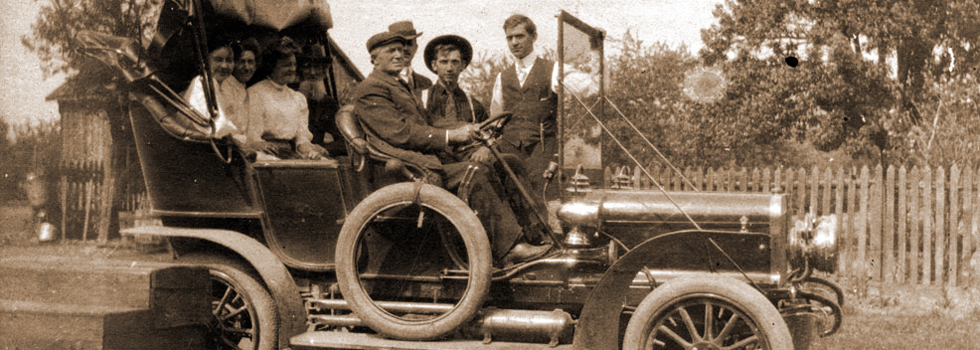
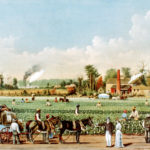
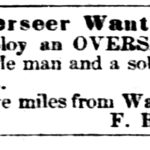
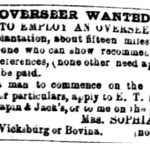
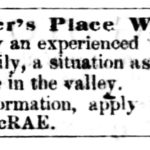
I curuios if you found any sources that might explain how English farming skills faired in Virginia environment. Who really knew how to farm and get successful crops? Grains from England might have survives, but many African crops, Sugar Cane, Rice, and Cotton were not known crops of the English Mannor. If the Overseers were English as well, then who knew? Tobacco and Corn farming were learned from the Indigenous people.
So, someone must have known, the seeds, when to plant, when to harvest and how to store?